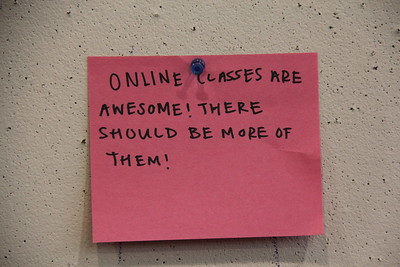For community colleges hoping to draft on the online education trend, the University of Florida has just delivered some bad news: online coursework delivers only limited benefits to community college students. According to the pre-print study, which appeared last month in Education Researcher (online), Black, Hispanic and low-income community college students who took mostly online classes were less likely to graduate with a degree.
A University of Florida researcher examined transcripts of 40,000 community college students who took classes between 2009 and 2019. Students who took fewer than 25% of their classes online were more likely to graduate with an associate degree than students who took more online coursework.These students were also 11% more likely to earn a bachelor’s degree.
The study noted the exact opposite effect for students who took all of their classes online. These students were less likely to graduate with an associate degree and nearly less likely to earn a bachelor’s degree. Black students who took most or all of their classes in person were nearly 25% more likely to graduate with an associate degree, while Black students who took most or all of their courses online were almost 20% less likely to complete a degree program. Hispanic and low-income students saw similar outcomes.
Dr. Justin Ortagus, who performed the research, suggested that online learning requires a student to be highly self-directed. He believes that most community college students – especially those from disadvantaged backgrounds – miss out on the positive benefits of traditional education when they take classes exclusively online. These positive benefits include direct interactions with faculty members, peers, and advisors, as well as academic support services available on campus. Dr. Ortagus believes these supportive benefits outweigh any flexibility that online coursework might offer.
Online classes don’t always measure up to in-person learning
While many students clearly prefer online classes, that preference does not always translate to academic success. Prior academic preparation is one key factor in success in online classes. Students who are academically prepared to take online coursework are more likely to succeed. Additionally, students who are likely to struggle with the course materials due to inadequate preparation are just as likely or more likely to struggle with a class delivered online.
Emerging research suggests that online, synchronous delivery may provide a greater level of community and student support. But Dr. Ortagus believes that regardless of whether online students learn synchronously or asynchronously, limiting online coursework provides a more reliable pathway to student success.
In light of what seems to be an emerging trend of outcome-based state funding models, community colleges would be well advised to avoid plunging head-long into online classwork. If graduation rates, completion times, employability within the student’s field of study, earnings after graduation, and other similar post-graduation metrics will affect public funding and/or federal financial aid, it makes sense to advise vulnerable associate degree and transfer students to avoid taking too many online courses.
Photo Credit: clemsonunivlibrary , via Flickr



















